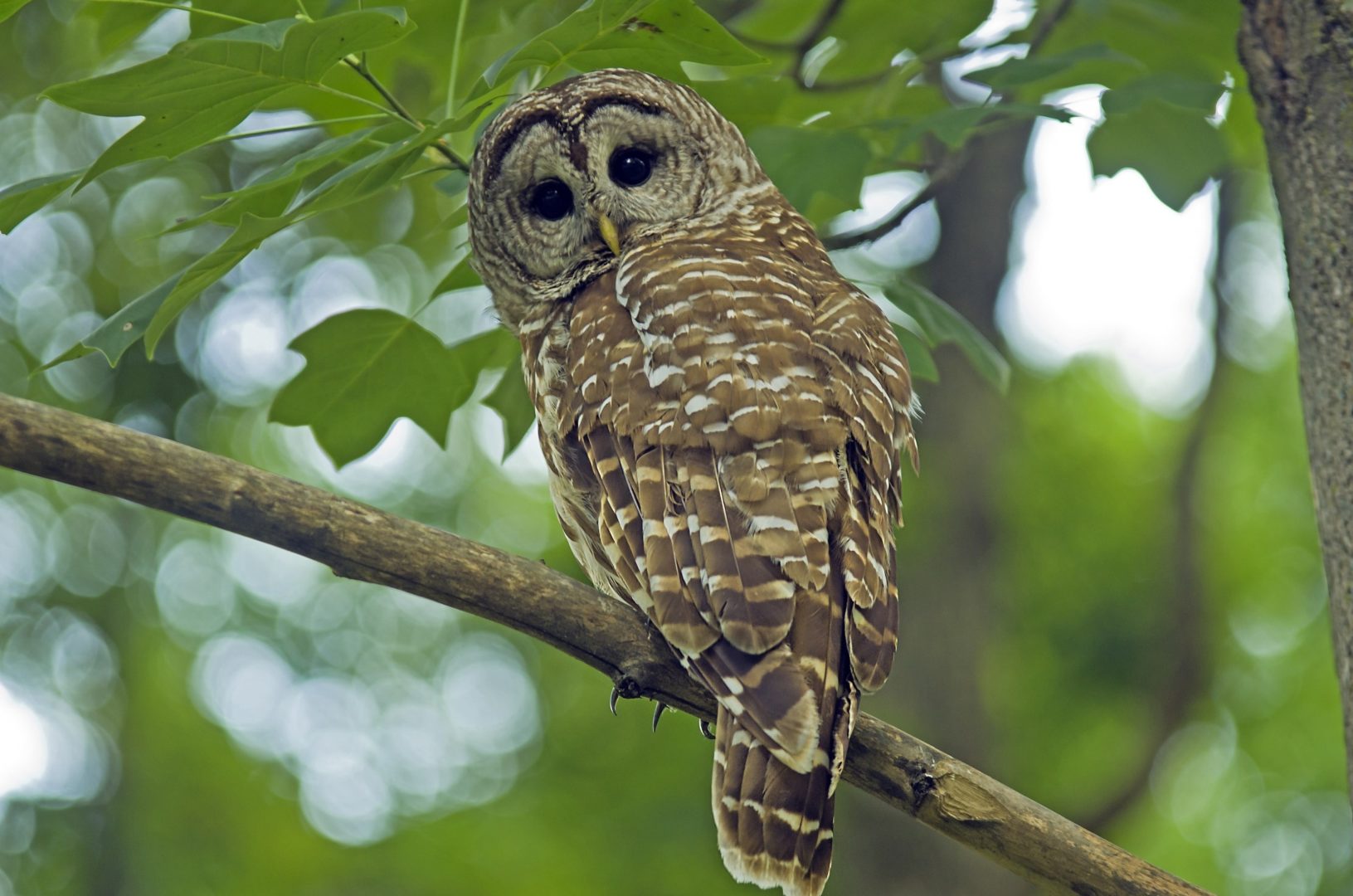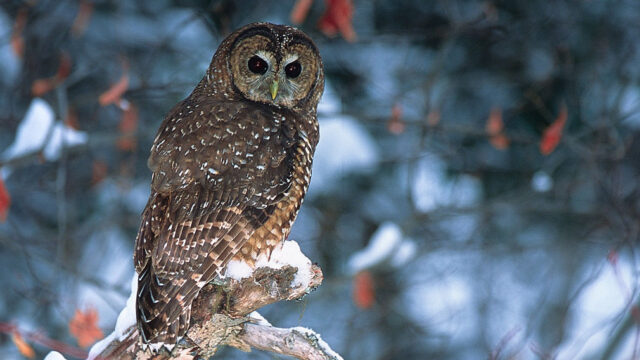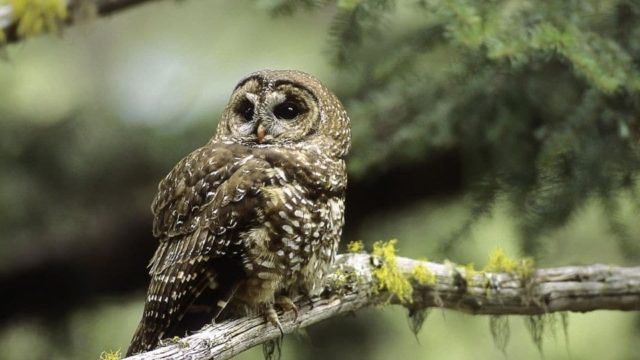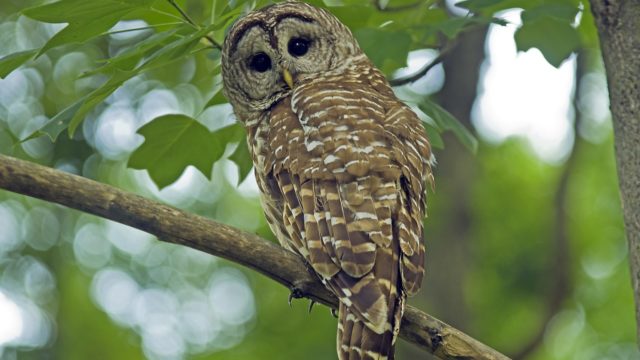VANCOUVER / UNCEDED xʷməθkʷəy̓əm, Sḵwx̱wú7mes and Sel̓íl̓witulh TERRITORIES — After decades of work to protect spotted owl habitat, on 23rd February, Wilderness Committee, Ecojustice and Spô’zêm Nation learned that federal Minister of Environment and Climate Change Steven Guilbeault is recommending an emergency order to protect the at-risk species from imminent threats to its survival and recovery. Federal Cabinet now needs to accept the minister’s recommendation for the emergency order to come into effect, after it consults affected First Nations.
“I can feel a celebration around the corner but things have never been more dire for the Spotted Owl and this emergency order is desperately needed now,” said Wilderness Committee Protected Areas Campaigner Joe Foy. “The B.C. government allows their forested home to be cut down and loaded onto logging trucks while breeding them in captivity to prevent them from going extinct. It’s time the federal government take over on an emergency basis so the spotted owl can one day recover back to healthy numbers within protected habitat.”
The minister has determined that logging needs to be prevented in Spuzzum and Utzlius watersheds, within Spô’zêm Nation territory, as well as in a further 2,500 hectares of forest habitat critical to the Spotted Owl’s survival and at high risk of being logged within the next year. As the Minister has found there are imminent threats to Spotted Owl survival and recovery from logging, he must by law recommend an emergency order. If accepted, the emergency order would be the third ever to be approved by Cabinet under the federal Species at Risk Act (SARA).
”Spô’zêm First Nation takes much honour in speaking for the last remaining northern Spotted Owls. I’m grateful for the recent opinion released by Minister Guilbeault regarding the Spotted Owl, “said Spô’zêm First Nation Chief James Hobart. “The province needs to stop all exploration and activity in any areas that could potentially put added duress on these already threatened messengers of our forests – the Spotted Owl.”
Minister Guilbeault’s recommendation is the result of a petition filed in fall 2022 by Ecojustice, on behalf of Wilderness Committee, demanding the federal government step in and halt logging in all areas of Spotted Owl critical habitat, given the B.C. government’s continued approval of industrial logging in these areas.
“The Minister has done the right thing by committing to recommending an emergency order, but this is only the first step,” said Ecojustice Lawyer Rachel Gutman. “We now need the federal cabinet to step up and actually issue an emergency order that protects the species’ habitat from further destruction. Spotted Owls are an old-growth dependent species so by protecting its habitat, an emergency order will also help address both biodiversity loss and climate change.”
Following a century of destruction and fragmentation of much of their habitat, only one wild and two captive-bred Spotted Owls are found in and around Spuzzum Valley. There were once about 1,000 Spotted Owls in the old-growth forests of southwestern B.C before the start of widespread industrial logging in the 20th century.
“Decades of industrial clear cutting has driven the wild population to just a single owl. This emergency order recommendation is 20 years late, but better late than never,” said Wilderness Committee Conservation and Policy Campaigner Charlotte Dawe. “We have SARA for a reason. It’s time the federal government prove they have the will to prevent the extinction of a species — to do that cabinet must approve the order.”
This is only the first step in stopping the owls’ track towards extinction. A delayed federal recovery strategy is currently posted for public consultation. It contains inadequate critical habitat maps that do not fully identify the actual habitat and corridors needed for the owls to survive and recover. The groups are calling on the federal government to fully map all Spotted Owl critical habitat and ensure it’s permanently protected. Further, Environment and Climate Change Canada needs to release the imminent threat assessment and maps used to make the emergency order recommendation immediately to allow the public to understand what habitat needs to be protected and why.
About
The Wilderness Committee works to protect life-giving biological diversity through strategic research, community mobilizing and grassroots public education. Their offices are located in Vancouver, Victoria, Winnipeg and Toronto and supporters, volunteers and activists from coast to coast to coast. They take action to preserve wilderness, protect wildlife, defend parks, safeguard public resources and fight for a stable and healthy climate.
Ecojustice uses the power of the law to defend nature, combat climate change, and fight for a healthy environment. Its strategic, public interest lawsuits and advocacy lead to precedent-setting court decisions and law and policy that deliver lasting solutions to Canada’s most urgent environmental problems. As Canada’s largest environmental law charity, Ecojustice operates offices in Vancouver, Calgary, Toronto, Ottawa, and Halifax.
Spô’zêm First Nation (Spuzzum) is an unincorporated First Nations settlement nestled on the Trans-Canada Highway 1 in the lower Fraser Canyon, 30 km (50 km of road) north of Hope, B.C. Spuzzum Nation is a Nlaka’pamux First Nations government located in Spuzzum. The majority of the reserve is natural canyon land and covered with first and second growth forest. Spuzzum is pursuing economic development that aligns with core community values to assist in the economic growth of its members.




